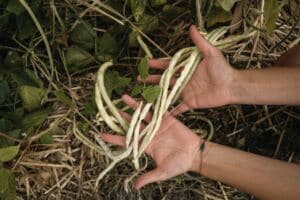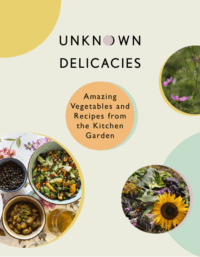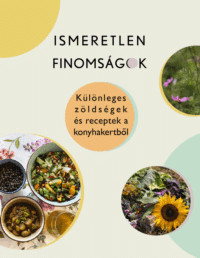Location: Hungary
LEAD partner: ESSRG
Involved partners: Magház Association
Conservation and management of vegetable landraces focused on seeds and seed-saving behaviour from a gender perspective
Under the term “agrobiodiversity” we mean the diversity and variability of animals, plants and micro-organisms used directly or indirectly for food and agriculture. In this case, we decided to focus on seeds, specifically seeds of vegetables. A landrace vegetable is traditional variety that has developed over time, through adaptation to its natural and cultural environment.
While the institutional logic of the formal seed system (that aims to track and control every step of seed production through different bureaucratic processes) dominates the market, the informal seed systems based on solidarity have recently gained momentum in the terms of a stronger social movement and increasing citizen and community engagement.
Analysing the literature about the connection between gender and agrobiodiversity it quickly becomes obvious that working with seeds is highly gendered: the management of seeds (including selection, seed saving, seed cleaning and seed storage) almost always belongs to the realm of women. However, research programmes about plant genetic resources (PGRs) often focus on crop production and usually on market-oriented crops. This way, the “reproductive” side of farm households and gardening falls beyond the scope of research – including crops grown for home consumption as well as foraging. These are integral parts of small-scale and subsistence farming but are often overlooked.
Expected impacts
Biodiversity
Cultivated species (domesticated plants and animals as well as microorganisms supporting agricultural systems) are just as important a part of biodiversity as the wild ones. This case will raise awareness about the diversity of seeds and support a better understanding of the values connected to seed saving.

Photo: Várallyay Nóra
Individual level
Participants of the local seed networks can actively influence agrobiodiversity. In fact, anybody can actively influence agrobiodiversity through their choices of food consumption. It is crucial to raise awareness about the fact that one does not have to have a farm to make decisions that support agrobiodiversity. By increased knowledge and resilience, individuals gain an empowered attitude.
Community level
The initiative:
- promotes stronger and extended local informal networks related to seed distribution and conservation of genes and species
- increases the awareness of the threat of the rapid spread of intensive, industrial agriculture
- raises awareness of agrobiodiversity for farmers, retailers, consumers, public administrators, and researchers.
Institutional/Policy level
The case study addresses the national and EU seed legislations, biodiversity strategy, and the Common Agricultural Policy (CAP). In terms of seed legislation, the current EU legislation is supportive, while the Hungarian one also enables more flexible opportunities for seeds related topics, such as having the opportunity to actually sell seeds and seedlings of landrace vegetables.
However, the CAP and some common agricultural practices are clearly in favour of large-scale industrial farming which does not support the diversity of agriculture at all. With the ongoing process of seed reform in the EU, there is also a risk of changing the current seed legislation in a way that helps industrial actors instead of diversity. This seems to be in the case of the legislation of new GMOs, which is quite concerning.
ESSRG aims at mapping the seeds system dynamics in Hungary, primarily the informal seed system actors.
Intersectionality dimensions
Gender aspect: management of agrobiodiversity is gendered; thus, the case brings the variable “gender” to the analysis of the seed system in Hungary to highlight its gendered dimensions. Seed management, seed collection, etc. is usually associated with women; in Hungary too, most seed associations are composed of women.
While understanding the role of women and men in the seed systems is a significant step, we believe that focusing on systematic aspects of gender theory is much more important than analysing the role of individuals. Seed saving and conservation of open-pollinated varieties have an important aspect of beauty, spirituality and the connection to nature (and other people), which are usually considered to be feminine areas.
If we extend the gender theory to the system level of agrobiodiversity, we see that the current formal – patriarchal – system logic treats seeds solely as resources for food production (this phenomenon can also be caught at the wording of international agreements: “plant genetic resources”); usage of seeds can be limited, even patented. Introducing feminist theory, however, we immediately see that there’s a lot of cultural context involved in the topic of seeds as well as the theory of care – caring for nature, for heritage (carrying on family or national heritage seeds), for family (in the present in the form of growing food and medicine) and for future generations (saving open-pollinated and adaptable seeds). We believe that if we want to achieve transformative change and want to create a more resilient seed system (which would be the base of a more resilient agricultural system), it is crucial that we focus more on these systems approaches of gender theory instead of just analysing the individual level of seed-savers.
Working approach
- Desk research and literature review
- Key informant interviews
- Transect walks with farmers in their gardens
- Field visits / participatory observation (visits to some of the farms/farmers, interviewing in the field, possibly doing seed savings too)
- Deliberative-participatory methods (e.g., digital storytelling or photovoice)
- Visual methods for capturing the seed savers and seed savings activities
PUBLICATIONS
Download the Agrobiodiversity infographic (ENG)
Download the Agrobiodiversity infographic (HU)
Ismeretlen finomságok – különleges zöldségek és receptek a kertből (magyar)
PLANET4B on the Graz Seed Festival




